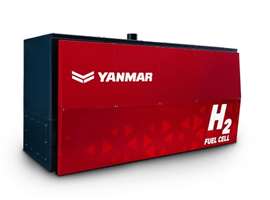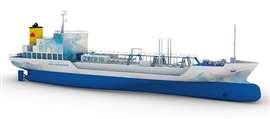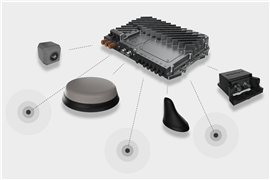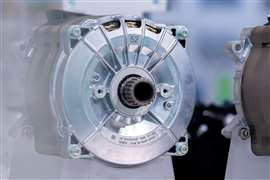Read this article in Français Deutsch Italiano Português Español
Yanmar maritime fuel cell system received approval in principle
22 January 2024
 Yanmar H2 maritime fuel cell (Photo: Yanmar)
Yanmar H2 maritime fuel cell (Photo: Yanmar)
Yanmar Power Technology, a subsidiary of Yanmar Holdings, has received approval in principle for its Maritime Hydrogen Fuel Cell System from Nippon Kaiji Kyokai (ClassNK), a Japanese maritime association.
The approval covers the system and its related modules meeting prescribed requirements for fuel cell power systems based on ClassNK’s Guidelines for Fuel Cell Ships (2nd Edition). The confirmation follows testing conducted in accordance with relevant standards.
The primary objective of the system is support the use of zero-emissions ships in the maritime sector, effectively eliminating carbon, NOx, Sox and PM emissions.
Design of the system has a focus on ease of installation, with a configuration that integrates auxiliary components such as gas valve units into the system housing. The system also supports parallel connection of multiple units, allowing it to be used in a diverse range of vessels.
Yanmar’s Maritime Hydrogen Fuel Cell System is suitable for passenger ships, workboats and cargo ships operating in coastal areas with access to a hydrogen infrastructure. The fuel cell system should serve as a step towards sustainable and environmentally-friendly maritime power solutions.
In 2021, Yanmar carried out first tests of its maritime fuel cell system onboard a prototype vessel. This further included the first high-pressure refuelling event using a 70 MPa high-pressure hydrogen refuelling system.
In related news, in early January this year Yanmar Power Technology reported it had started development of a hydrogen-fuel four-stroke engine intended for maritime applications.
 Rendering of hydrogen fuel engine electric propulsion ship (Photo: Yanmar)
Rendering of hydrogen fuel engine electric propulsion ship (Photo: Yanmar)
In parallel, the company will work on a hybrid hydrogen-electric propulsion vessel which will combined the H2 IC with battery storage. The ship will be constructed in partnership with Uyeno TransTech, part of the Uyeno Group.
Variants of the engine will use a pilot biofuel and hydrogen co-combustion strategy, while a hydrogen spark ignition model will also be developed.
Verification tests of the six-cyclinder engine are set to start over 2024.
POWER SOURCING GUIDE
The trusted reference and buyer’s guide for 83 years
The original “desktop search engine,” guiding nearly 10,000 users in more than 90 countries it is the primary reference for specifications and details on all the components that go into engine systems.
Visit Now
STAY CONNECTED




Receive the information you need when you need it through our world-leading magazines, newsletters and daily briefings.
CONNECT WITH THE TEAM













